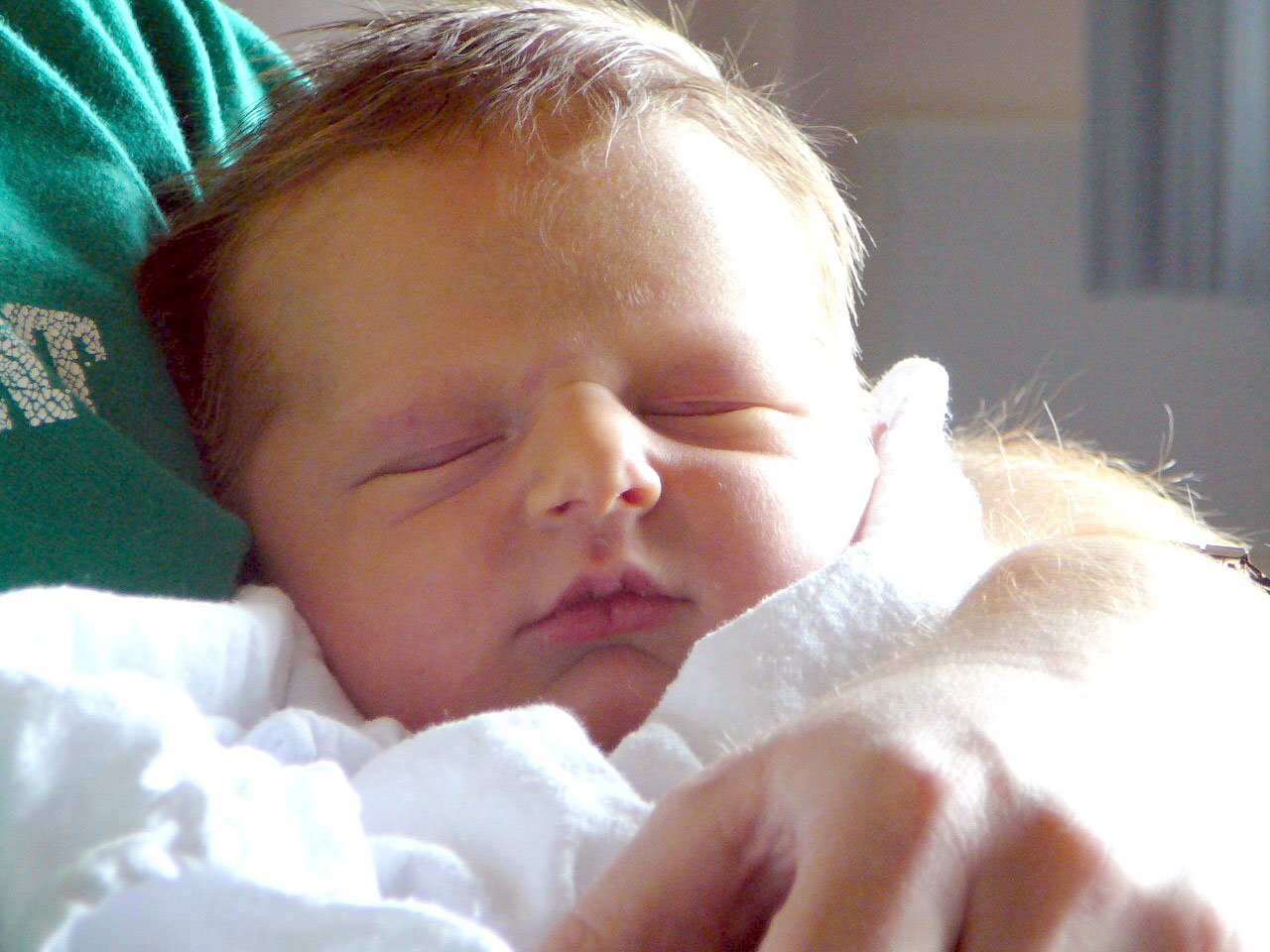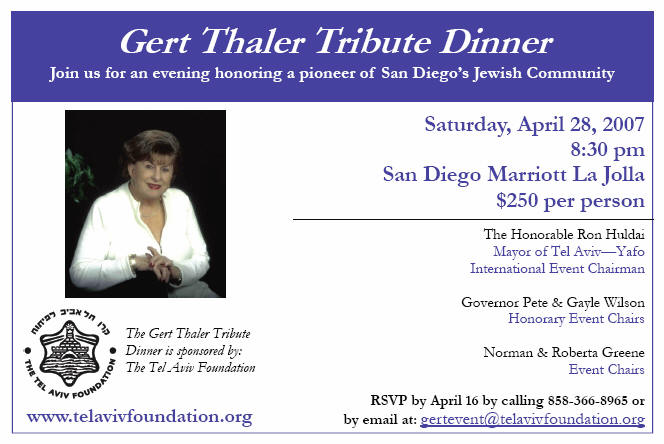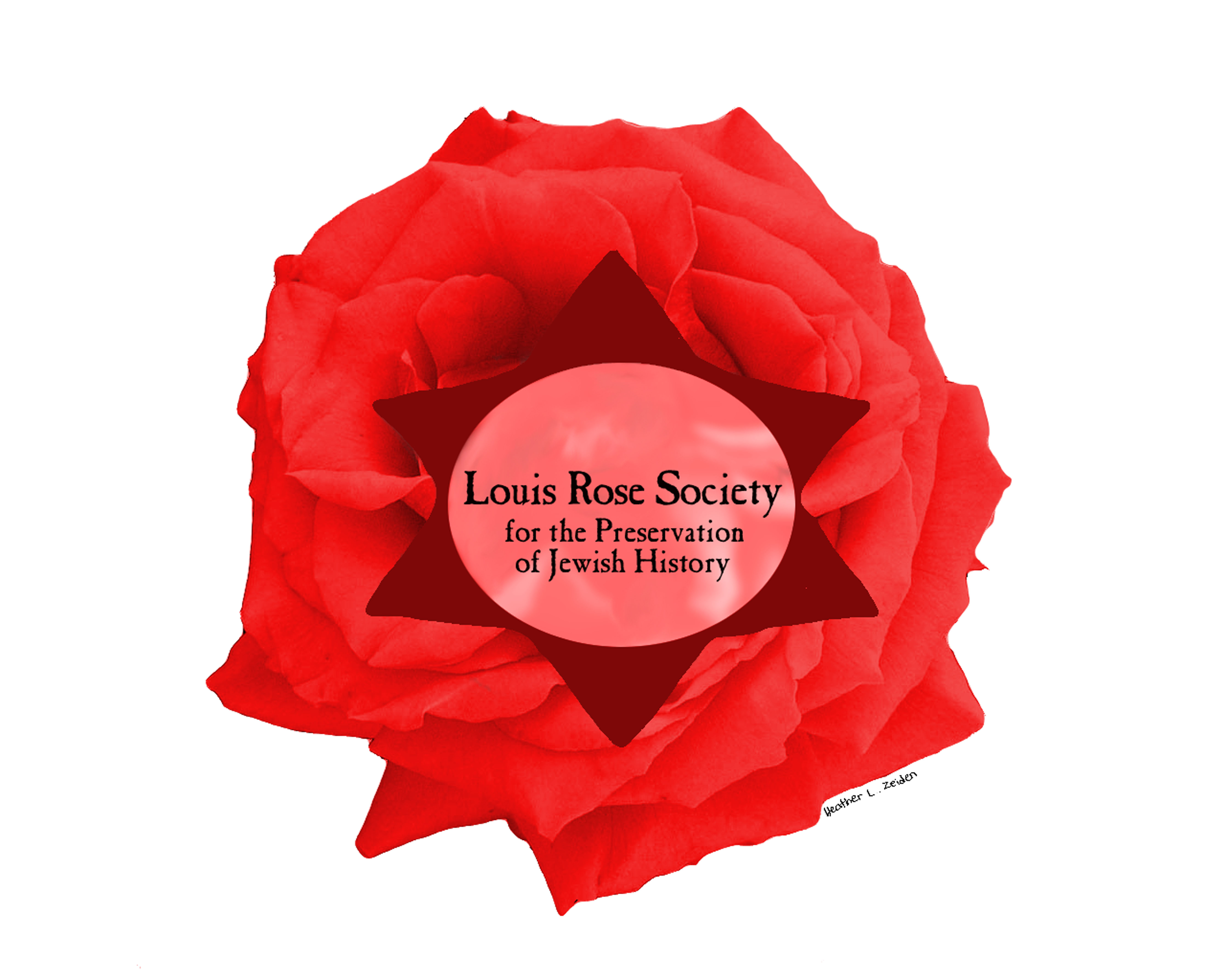|
U.S. Senator Barbara Boxer urges
attendance at Shoah commemorations
By Barbara Boxer
U.S. Senator from California
WASHINGTON, D.C—In 1980, Congress established
Holocaust Remembrance Day toeducate Americans about the history of the
Holocaust andcommemorate its victims. The observance is held on
the datecorresponding to the 27th day of Nissan on the Hebrew calendar,
which is known as Yom Hashoah. This year, Holocaust Remembrance Day falls on
Sunday, April 15th, and is widely observed on the following day.
The United States Holocaust Memorial Museum in Washington, DC
has been mandated by Congress to lead the nation’s Days of
Remembrance. Details about this year’s observances can be found
online or through the
Holocaust Memorial Museum’s
main website at
In Los Angeles, the Simon Wiesenthal Center’s Museum of
Tolerance has organized a number of events during Holocaust
Remembrance Week; details can be found
online. To learn more about this vibrant learning center, visit its
website.
{Editor's note: San Diego's community observance will be held at
1:30 p.m., Sunday, April 15 at the Lawrence Family JCC, with Israel
Consul-General Gilad Millo the principal speaker.}
The Holocaust Memorial Museum has designated “Children in
Crisis: Voices from the Holocaust” as the focus for this year’s
observance. When the Germans and their collaborators sought to
destroy a Jewish community, children were frequently among the
first to be murdered. Upon arrival at Auschwitz and other
killing centers, most children were sent straight to their
deaths in the gas chambers. Only a small fraction of European
Jewish children survived the Holocaust, many because they were
hidden by people and institutions of other faiths.
During the Holocaust, Jewish children channeled their suffering
into creative expression. Some wrote letters and drew pictures
about life under extreme circumstances, while others like Anne
Frank kept diaries of their experiences.
The children of my generation heard the story first hand from
the survivors. Around my kitchen table, I heard about Anne
Frank and cried for her stolen youth and her stolen life.
Now, more than six decades after the unspeakable Holocaust, we
must work doubly hard to keep its history clear and alive in
the world’s memory. Whether you take part in a major event or
just take a moment out of your day, I hope that you will
participate in Holocaust Remembrance Day. For it is only
through remembrance — by speaking the unspeakable, by telling
the story of the Holocaust to our children, to our
grandchildren, and to the world— that we can prevent future
holocausts.
______________________________________
Doing It Better
by Natasha Josefowitz,
PhD
A generational gap in
a retirement home
LA JOLLA, Calif. —A
woman is standing at the door of the dining room—she checks whether the
women coming in have stockings—a dress, no skirts, no sandals and whether
the men are properly attired in dress shirt, tie, and blazer. The year is
1958 and the place is the White Sands of La Jolla, a retirement
community—and one of many retirement homes where the dress codes were
strictly enforced. The year is now 2007, jeans and shorts for breakfast and
lunch, casual pants and shirts in the evening, a small attempt to look a bit
more dressy for Sunday brunch, but my guest arrived in shorts and no one
asked him to leave.
There was an attempt a couple of years back to divide the dining room into
dressy and casual sections, the people who did not get the side with the
ocean view grumbled so the room was redivided vertically with some windows
for each, but people got confused; the potted-plant dividers disappeared and
now some people come ready for a party and others dressed for a beach day,
all of them happily eating together.
It is surprising to realize that some elder folks have never owned a pair of
jeans, a sweat suit, or ever a T-shirt and would find it unthinkable to wear
anything like that; they come to exercise class dressed in their street
clothes. In their time each activity had its own costume: tennis whites,
riding habits, bathing costumes.
But the dress codes are not the only generational differences. There are
people living here who came of age during the depression era, they are in
their late eighties and nineties (we also have three centenarians living
here), while the newer arrivals in their late sixties and seventies have
their roots in post-war prosperity. The latter want up-to-date exercise
equipment like the elliptical trainer, they want a healthy diet with whole
grains, root vegetables, and more exotic dishes versus the old standbys of
the more senior crowd who are used to meat-and-potato staples and decry the
use of unfamiliar names for new dishes. They were happy with macaroni and
cheese (white-flour pasta of course) verses the newer buckwheat pasta with
stir fry. So now there is both.
Change is always difficult, and high-speed internet and more space for a
42-inch TV are not priorities for the older crowd who see their fees going
up with remodeled apartments, upgraded carpeting, and new paint jobs.
The generation born in the second quarter of the last century, called the
Silent Generation has become more vocal facing the requirements demanded by
the Baby Boomers coming into their retirement years. So retirement
communities have the delicate task to balance respect for tradition, such as
bible classes, morning prayers, and vespers, while showing respect for
different faiths or no faith and offering weight rooms, large fitness
centers with personal trainers, a masseuse, a doctor’s office on the
premises, yoga, and tai chi. It really comes down to need of formality—being
served at table and playing bingo—versus buffet service comfort with
emphasis on health and educational programs. A vestige of formality still
exists in the discouraging of table hopping, which the newer residents do
not heed.
The younger retirees also want larger spaces, full kitchens, and their own
washer-dryers. White Sands has been combining units to fit that need. What
started out as 299 small units has been transformed into 140 larger ones.
Whereas White Sands’ population is now 25% couples, the couples coming into
the new units are younger and are 65% of that population.
Plans are for a ten-bed dementia unit and to keep the four-tier plan of
independent living, a non-ambulatory floor, assisted living, and skilled
nursing. The new people will have the opportunity to have just one meal a
day, while those of us already here had to sign up for three. Yet, the
director, Wendy Matalon, believes that within a year, for most, the one meal
will become three. It’s just that it’s much easier to not have to shop,
cook, clean up, or go to a restaurant, but instead just walk a few steps,
sit down, and have a large menu selection to choose from. White Sands staff
encourages residents to take food home for snacks, such as fruits, cheeses,
and pastries.
Retirement communities everywhere are struggling with these
inter-generational issues, and as I write this, I wonder what will my
grandchildren need and wish for when they will reach their retirement age—I
just calculated that it will be in the mid-century and many of us won’t be
here to find out. Just as well!
_______________________
The Jewish Grapevine

EDUCATION BEAT—In the April 8 edition of Jewish Grapevine,
we told of an upcoming conference in
Albuquerque, N.M., focusing on Crypto-Jews, people who trace their descent
from Jews who converted to Christianity under pressure of the Spanish
Inquisition. Prof. Judith Neulander,
co-chair of the Judaic Studies Department at Case Western
Reserve University in Cleveland, says that there is controversy over the
validity of many of these claims of Jewish descent.
Here is an article that
Prof. Neulander wrote explaining why the claims of Crypto-Jews is far less
than clear-cut. ... Lawrence Summers is an economist and a former
U.S. Secretary of the Treasury, but perhaps will be best remembered by our
community as the former Jewish president of Harvard who spoke out against
anti-Semitism (we
link to a 2003 article by him on the subject). Summers will speak
at a breakfast meeting of the San Diego Economic Roundtable, beginning at
7:30 a.m. April 30 in the UCSD Faculty Club. An
online fee of $50 fee
covers the speech, continental breakfast and Summer's presentation.
HEALTH CARE—Ryan Altman,
chief executive officer of the
Alternative Healing Network, Inc., is putting together the 3rd annual San
Diego Healing Arts Festival on Sunday, May 6. The festival, to be
held on the lawn at Park and Presidents Way in Balboa Park, will feature
live music and "free massage, acupuncture consultations, demonstrations in
dance, Tai Chi, laughter yoga, classes in Yoga, Qi Gong, bellydance, pilates,
and more." Altman says his career in putting on events started back in his
B'nai B'rith Youth Organization days: "I basically learned how to do this
through my time in BBYO in High School. I even attended the International
Summer Programs at Perlman Camp. I've been into planning events ever since
my time as S'gan of the Marc Chagall AZA Chapter # 240." For
information on the event, he may be reached at 619-261-1418.
MUSEUMS—Because it will be hosting the separate-ticket Dead Sea Scrolls
exhibit from June 29 through the end of the year, the Natural History
Museum in Balboa Park is reducing its general admission prices beginning
May 1 to $9 for adults, $7 for seniors, $6 for military, youth 13-17 and
students, and $4 for children 3-12. A news release advises: "On June 29,
2007, the Museum will open 'Dead Sea Scrolls,' the largest and most
comprehensive exhibition of Dead Sea scrolls ever assembled (outside of
Israel) as well as other ancient artifacts and biblical manuscripts. Tickets
to the exhibition are not included in general admission; however, 'Dead
Sea Scrolls' tickets include admission to the rest of the museum. So
what's left to see for general admission patrons? Fossil Mysteries is
an $8 million permanent exhibition depicting the 75 million year prehistory
of Southern California and Baja California; the Discovery Room has live
animals and plants; the Ordover Gallery, with fine art nature photography,
and the museum's giant screen theatre.
 SIMCHAS—Benjamin
Jacob Romney, son of Marc Romney and Barbra Arnold, was
born on April at St. Paul's Hospital, Vancouver, British Columbia, Canada.
He weighed 8 pounds 6 ounces and measured 22 inches long. He is the
grandson of David and Claude Romney, who are residents of
Vancouver. David, Professor Emeritus of Clinical Psychology at the
University of Calgary, is the nephew of Rabbi Charles Heilpern, who
spent his last years in San Diego and who is buried at the Home of Peace
Cemetery. Once a rabbi in Bournemouth, England, much of Heilpern's later
life is a mystery, including the circumstances leading to his coming to San
Diego prior to his death in 1974. David Romney is seeking information so
that Benjamin might someday know all about his great-great uncle, and anyone
with information is encouraged to contact him at
romney@ucalgary.ca SIMCHAS—Benjamin
Jacob Romney, son of Marc Romney and Barbra Arnold, was
born on April at St. Paul's Hospital, Vancouver, British Columbia, Canada.
He weighed 8 pounds 6 ounces and measured 22 inches long. He is the
grandson of David and Claude Romney, who are residents of
Vancouver. David, Professor Emeritus of Clinical Psychology at the
University of Calgary, is the nephew of Rabbi Charles Heilpern, who
spent his last years in San Diego and who is buried at the Home of Peace
Cemetery. Once a rabbi in Bournemouth, England, much of Heilpern's later
life is a mystery, including the circumstances leading to his coming to San
Diego prior to his death in 1974. David Romney is seeking information so
that Benjamin might someday know all about his great-great uncle, and anyone
with information is encouraged to contact him at
romney@ucalgary.ca
-------------------------------------------------------------------------------
.Advertisement:.J

------------------------------------------------------------------------------
 Jews
in the News
--------------------------------------------------------- Jews
in the News
---------------------------------------------------------
News spotters: Dan Brin in Los Angeles,
Donald H. Harrison in San Diego. If you'd like to be a spotter in your
California city, please contact Harrison at
sdheritage@cox.net.
_______________________________________________________________________
*Real
estate investor Albert Mizrahi has been offering to buy commercial
properties in the Larchmont Village area of Los Angeles, near the Wilshire
District, sending shock waves through the community that favorite stores and
restaurants won't be able to pay their rents. James Ricci
reported this story in the Los Angeles Times.
*
California Insurance Commissioner Steve Poizner has announced that
two persons have been convicted for their roles in an insurance
scam. He said that Yvette Diaz and Carlos Macias of International
Commercial Insurance of Long Beach pretended to sell policies to trucking
businesses but did not forward the premiums to legitimate insurers.
Instead the money was pocketed and victims were issued phony receipts.
Diaz was sentenced to 52 months in prison while Macias received to three
years probation. Both were ordered to pay restitution and court fees.
*Defense attorneys in record producer Phil Spector's trial on charges
that he murdered actress Lana Clarkson apparently will try to prove she
committed suicide, Peter Y. Hong
reports in the Los Angeles Times.
*New York Gov. Eliot Spitzer has set Feb. 5 as the date for his
state's presidential primary election, the same date as California's,
insuring that date is the biggest on the presidential primary calendar.
*Howard K. Stern, the lawyer listed on the birth certificate as the
father of Anna Nicole Smith's baby, turned out not to be after all. DNA
testing matched the potential heir with Smith's former boyfriend, Larry
Birkhead. Los Angeles Times reporter Michael Muskai had
the story.
---------------------------------------------------------------------------------------------
|


